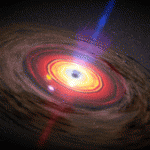Cosmos: Black Holes
A black hole is the dramatic collapse of a massive star into a gravitational abyss. This "hole" is any concentrated region in the universe where the gravity has become so infinite that absolutely nothing can escape its pull, including light.

There is usually a large, rapidly spinning region around a black hole, where the massive gravitational force is so great that gases and neighboring objects such as stars are pulled into an accelerating orbit around the hole. When objects, gas or even light are pulled in as far as the the black hole's event horizon there is no escape. Although there is a great deal of speculation, it is not known whether black holes survive forever, or whether they slowly wither away.
Black holes are among the most fascinating phenomena in the universe. They are often perceived as a destructive, almost evil force, but as scientists learn more about them it seems they represent one of many paradoxes in nature: they both create and destroy. They are scattered in all sizes all over the known universe. However the most massive holes discovered so far have been located at the center of galaxies, where they simultaneously devour gases and objects and maintain the dynamics of the galaxy. Scientists are particularly interested in black holes because they may resolve the contradiction between the two major concepts of physics, Einstein's relativity (large-scale phenomena) and quantum mechanics (sub-atomic phenomena).
